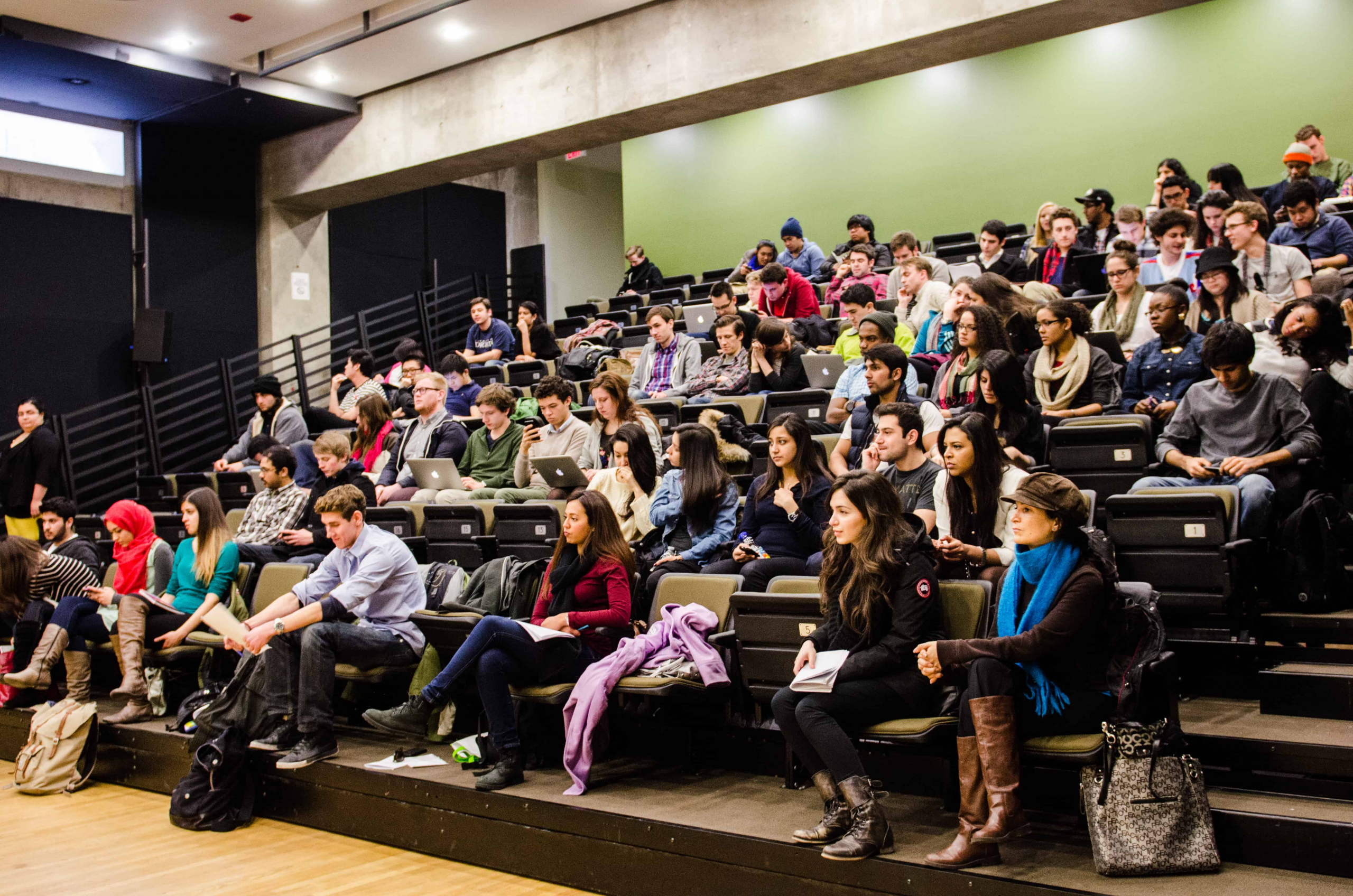Student leaders, observers and press sat down in the William Doo auditorium on Wednesday evening to listen to the uncontested candidates from the Renew slate in this year’s UTSU elections. Each candidate made statements before a brief question period that covered topics from ancillary fees to college and faculty fee diversion. The candidates were affable, and promised substantive reforms in the area of international student fees, better communication between colleges and the UTSU, and an ongoing petition for a drop credit policy. But they were also evasive at times and struggled to answer direct questions.
Vice-president, university affairs candidate Agnes So was scheduled to be the first speaker at the debate, but was unfortunately unable to attend for personal reasons. Prospective president Munib Sajjad read a personal statement on her behalf but there was no question period for her position. The majority of the other candidates seemed to experience difficulty putting their policies for reform into words effectively. On several occasions they took inordinate amounts of time responding to basic questions, such as when Trinity co-head of college Sam Greene posed a hypothetical question to Sajjad regarding whether or not his administration would seek legal action if disgruntled colleges and faculties around campus attempt to divert their fees from the UTSU. Sajjad was elusive in his response, stating, “The union stands for unity. If students want to participate in the union they will do so.” This prompted jeering from some of the audience, which was ultimately left unsatisfied.
Sajjad was not the only Renew candidate guilty of such obviation. Vice-president, internal & services candidate Cameron Wathey and vice-president, equity candidate Yolen Bollo-Kamara both avoided directly responding to questions, sometimes even about issues addressed in their opening statements. This was the case when Bollo-Kamara was asked about how she would endeavour to combat sexism on campus; she had previously identified the issue as being central to her platform. Her answer was surprisingly unspecific. When Wathey was asked for his thoughts on the possibility of several colleges petitioning to have their fees diverted from the UTSU, he said, “I personally don’t know too much about this situation.” He did, however, offer that he would like to, “work this out,” and suggested better communication with the Trinity College Meeting as a means of ameliorating the situation. One student claimed that the union spends $900,000 on salaries and only a third of that figure on clubs. Wathey sympathized, revealing that he had personally suffered as a member of underfunded clubs, but ended his answer by stating that the union requires full-time staff in order to operate, without mentioning compensation structures whatsoever.
All candidates, perhaps with the exception of Sajjad, seemed flustered when asked challenging questions, which elicited some uneasiness in the crowd. They were happy to lean on platitudes in their responses rather than meet specific questions head on with firm answers based in developed policy ideas. They returned to their responsibility to represent “47,000 students” and the need for “unity” in order to successfully implementing their ideas.
A rather inflammatory question came later from the floor, directing vitriol at some student leaders in the room suggesting that they “did not have the guts” to run for the UTSU themselves. This prompted a walkout by some in the crowd who, as they left, demanded an answer from Sajjad regarding legal action against those bodies considering leaving federation. Following this disruption, however, the debate carried on.
Ultimately the debate left much to be desired. Questions went unanswered and unsatisfactory responses were repeated. The candidates did display some passion and determination to effect change and deserve credit for subjecting themselves to the scrutiny which comes with running for office, but they didn’t outline clear policies.
As the candidates prepare to assume their positions, we have scarcely been brought closer to knowing who they are. We should be concerned.
Alec Wilson studies political science and American studies.
Candidate platforms
Munib Sajjad
President
- Fight injustice in the post-secondary education system
- Put international students on governing council
- Allow utsg students to opt into the utm shuttle bus
- Work with other unions in the gta to improve student access to transit
Sana Ali
VP, external
- Unite the fragmented and de-centralized student body through the union
- Produce a students’ rights handbook
- Increase the amount of study space in libraries
- Develop a relationship with the government that allows negotiation rather than antagonism
Cameron Wathey
VP, internal
- Increase clubs funding and offer help with budgeting
- Extend the food bank’s hours
- Host a homecoming
- Improve communication with members through a student life guide, a new website, and town halls
Yolen Bollo-Kamara
VP, equity
- Fight all forms of repression on campus
- Defend the typ program
- Improve caps and break down the stigma surrounding mental health
- Create an accessibility fund to encourage clubs to be accessible
Agnes So
VP, university affairs
- Fight to flat fees and illegal ancillary fees
- Produce an academic appeals guide
- Improve food options on campus
- Host financial aid workshops


